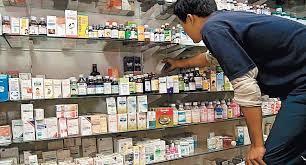Pharmacies on Strike
June 1, 2017 | Expert Insights

Members of the All India Organization of Chemists and Druggists went on one day strike on Tuesday, in protest of government’s move to regulate the sale of drugs through an e-portal. More than eight lakh chemists have participated in the strike. The proposal aims to monitor the sale of drugs and unearth the source of inferior quality drugs. An independent body would be set up to run the e-portal where drug makers, wholesalers and distributors need to register themselves. Both private and public hospitals also need to specify details of medicines they deliver to patients.
What has instigated the chemists?
Under the goods and service tax programme, the government has proposed to introduce e-portal to regulate the sale of quality drugs and curb antimicrobial resistance. Pharmacists have been asked to upload online details of transactions and also pay fees towards the cost of running the portal. Chemists assert that e-portal would wreck their business along with concerns like storage facilities, meeting deadlines for upload of data and credibility of the drug supplied online.
Analysis
The Drug Controller General of India in 2015, stated that online sale of drugs is a violation of the Drugs and Cosmetics Act. There are a number of websites that operate legally and offer convenience and safeguard for purchasing medicines. But there are rogue websites too that sell potentially dangerous drugs that have not been checked for safety or effectiveness. A committee was set up to look at and monitor these sales. A report submitted by this committee in 2017 recommended a centralized online portal for supervising the same.
In 2014, several online pharmacies were set up to harness the market worth more than $10 billion. As a result, in October 2015, more than eight lakh chemists went on a strike to protest against online drugs sale. The AIOCD claimed that sale of medicines through e-pharmacies must be abolished as it is illegal.
Assessment
E-portal would help consumers receive quality drugs. In a country like India where a majority of the rural population are technologically challenged, it would be a difficult task to implement such decision. More power supply and a greater number of data operators should be assigned in the rural areas for data administration to increase the transparency, accountability and responsibility on the part of chemists to sell the better-quality drugs.








Comments